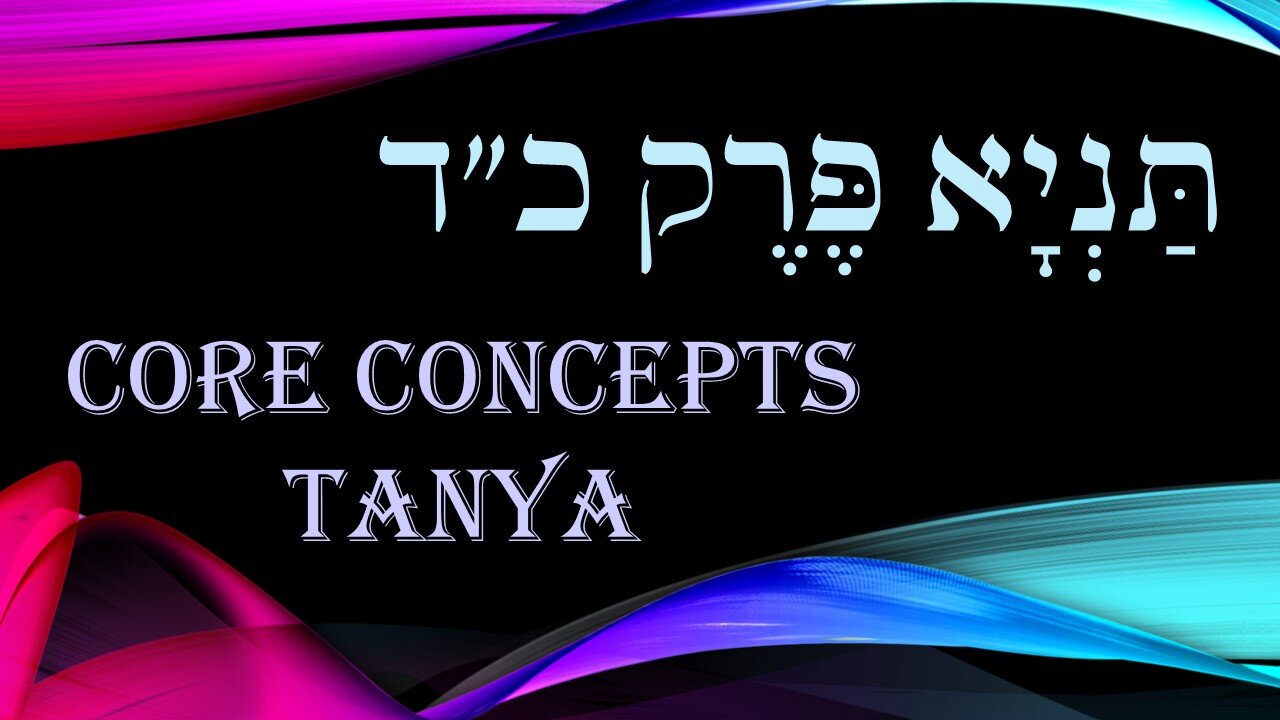Premium Only Content

Core Concepts Tanya: Chapter 24
Brief recap of Chapter 24:
1. Chapter 24 begins with reminding us "zeh l'umas zeh," "This opposite this," is the way Hashem created the world.
We know this about our souls, the powers and garments and expressions of our animal soul are a mirror image of the makeup of our G-dly soul.
This creates a specific sort of balance in the world and gives each side equal powers of expression so there is free choice and reward & punishment.
This considered, last chapter was about the type of unity that happens from Torah and Mitzvot.
This chapter teaches about what happens when someone does the opposite of Torah and Mitzvot.
2. When we speak about the Unity of G-d, we don't just mean that He is the ultimate, supreme being, but the only being. Nothing exists outside of Hashem.
Thus, idolatry isn't only a denial of Hashem through the worship of others gods, but also giving credence to anything that claims to exist separate from Hashem.
When we connect to Hashem, we humble ourselves to do as He wishes.
When we don't, we are allowing our ego and sense of self to take control, which is a denial of His unity.
3. Sitra Achara/K'lipa act to block G-dliness from entering this world.
This is the "other side" the darker, negative forces that resist Hashem's will.
However, the k'lipa and sitra achara only do what they were created for, to be the challenges and obstacles in our Divine service. Which is why k'lipa that's not in a body can't do anything that goes against its programming.
HOWEVER, klipa in a body is what leads our animal soul to take control and act in ways it shouldn't. This is an act of rebellion/denial of Hashem's absolute unity and a choice the body has made to go against its mission in this world.
Therefore, at the moment of sin, a person falls even lower than sitra achara, which are only doing their jobs.
4. K'lipa and sitra achara don't deny that Hashem exists, they deny that He is the only existence.
As in Chapter 22, they don't deny the encompassing life force, they deny the "internal life force" which says that Hashem is intimately involved in every aspect of creation. They call Hashem the "G-d of gods," and see themselves as being independent forces of existence separate and removed from Hashem. This is why giving in to sitra achara is tantamount to idolatry.
5. If a person steps out of line, we remind him that even "the gnat is before you."
First, the order of creation. The gnat, and all insects, were created on the fifth day. Man was created on the sixth.
Some say this is because Hashem wanted to create and prepare the world in its entirety so it would be set for man. Another reason is because if a person acts bigger than he is, he is reminded that even the tiny, lowly gnat preceded him in creation.
Second, a gnat is considered the epitome of k'lipa and selfishness, because it eats and eats without excreting, it gives absolutely nothing of itself.
At the moment of sin, a person sinks to a level even lower than a gnat and taps into a lower life-force than the one that brings the lowly, selfish gnat into existence. Such a thought should cause a person to recoil from sin, never wanting to sink so low.
6. The Torah tells us "The fear and dread of you shall lie upon every beast of the earth."
Although an animal doesn't know the difference between good and evil, it's spirit can sense it.
So, when a person does as he should, an animal recognizes that a person, the highest level in creation, rules over it.
Example, Daniel in the lion's den. The lions didn't attack because their spirits sensed his holiness, and they were also submissive to him.
However, if a person allows himself to sink to a lowly level, this creates the possibility where "a wild beast will never defy a human being unless he appears to it like an animal."
7. "A man does not sin unless a spirit of folly enters him."
This "Spirit of folly" is a reasoning and persuasion that rationalizes or excuses or compartmentalizes wrong behaviors.
For example, an adulteress would never give in to idolatry.
And yet, she is still committing one of the three mitzvot (idolatry, adultery/forbidden relationships, murder) that a person should die for rather than transgress.
Why? Because she creates a separation in her mind, maintaining that idolatry is different from adultery.
Considering these three mitzvot, maybe there are some mitzvot that are more important than others.
For example, Shabbos is considered one of the ultimate mitzvot.
Shomer Shabbos is the main thing that qualifies someone as a shochet.
However, if a person's life is in danger, then we are not only allowed but also required to transgress Shabbos to save him. So, there seems a difference between the mitzvot.
THE ONLY DIFFERENCE IS IN THE AFTEREFFECTS OF A TRANSGRESSION.
The moment a person sins, no matter how "big" or "small," he is creating a tear in his relationship with Hashem. Always.
The rules around a mitzvah are not a reflection of each one’s intrinsic worth.
Sins carry different punishments, so there's different ways of coming back from that sin, but at the moment of sin the effect is the same.
And every sin is a moment of separation from Hashem and a denial of His unity.
However, if we are willing to die rather than commit idolatry, then surely refraining from a "lesser" mitzvah is much, much easier!
8. Our relationship with Hashem is compared to a rope woven of 613 strands.
If we transgress a mitzvah, one of those strands frays.
When we do Teshuvah, we repair the strand.
However, a person can't sin and rely on Teshuvah to repair what was ruined.
But, if a person does transgress, he can knot the strand with Teshuvah.
There are certain transgressions whose effects are so severe that committing them cuts the rope entirely.
These sins are much harder to return from, but Hashem always "leaves the light on for us."
He might not assist our return in certain cases, but He always awaits it.
9. When a person is in exile, he is unable to truly express himself.
His ideas and abilities are suppressed and he can't achieve his fullest potential.
At the moment of sin, the animal soul drags the G-dly soul into exile wherein it cannot truly and freely express itself. Because the G-dly soul always believes and remains faithful to Hashem.
This is the ultimate and greatest exile it can undergo.
It's similar to a deep plunge from the highest of heights (remember, the G-dly soul comes from Hashem's chochmah) down to the deepest pits (sitra achara).
Another example is that it's like taking a king by the head and dunking it in a "privy full of filth," as there's no greater humiliation for it.
10. Considering all this, knowing how low we fall through transgression and even with knowing we can always do Teshuvah, we should use our "hidden love" to resist these temptations, thinking that we don't want to be separated from Hashem for even one second, that we would never allow anything to infringe upon our relationship with Him.
Our service of Hashem is a commitment to a lifelong relationship with Him.
Some days are better than others.
Some days we can really focus on things He wants, and thereby bind ourselves closer to Him.
And some days we do what we want and harm our relationship with Him.
But everything we do matters and there are outcomes for our actions.
We can use the above imagery to serve G-d out of fear, to recoil from anything that might separate us from Him.
And we can also focus on the things that will bind us closer to Him, working to emphasize the positive mitzvot to come closer to Him.
We just need to take things one step at a time.
Because every mitzvah that we do has an eternal reverberation.
PS: If this chapter affects you, if learning all this makes you feel guilty or bothered or upset or uncomfortable, then Mazal Tov! your relationship to Hashem means something to you.
You're on the right track, because you care. And that's an excellent place to build upon.
-
 LIVE
LIVE
Graham Allen
1 hour agoTrump NUKES Biden’s Entire “Legacy” + Did Candace Implicate TPUSA In Charlie’s Death?!??
17,713 watching -
 LIVE
LIVE
Matt Kohrs
12 hours agoLive Day Trading, Breaking Market News & Options Analysis || Stock Market Open
584 watching -
 LIVE
LIVE
Wendy Bell Radio
5 hours agoTime To Take Out The Trash
7,705 watching -
 1:09:52
1:09:52
Chad Prather
14 hours agoHow God Turns Pressure Into Purpose
58.6K26 -
 LIVE
LIVE
LFA TV
11 hours agoLIVE & BREAKING NEWS! | WEDNESDAY 12/03/25
2,868 watching -
 1:05:24
1:05:24
Crypto Power Hour
12 hours ago $5.95 earnedVanguard Finally! XRP ETF’s
44K7 -
 13:40
13:40
ARFCOM News
18 hours ago $2.51 earnedHis Wife Got Cancer So They Took His Guns + DoJ's 2A Rights Division + Trump Slump Continues
20.5K15 -
 13:19
13:19
Degenerate Jay
18 hours ago $2.86 earnedThis Fallout: New Vegas Discovery Could Change Everything
25.5K -
 33:35
33:35
ArturRehi
21 hours agoNERVES OF STEEL - American Fighters Are not Easy to Frighten in Ukraine
21.1K5 -
 2:05:17
2:05:17
BEK TV
1 day agoTrent Loos in the Morning - 12/03/2025
26.7K1